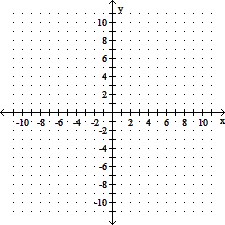Solve by graphing.


A. (14, 10)
B. (7, 5)
C. (5, 7)
D. (10, 14)
Answer: B
You might also like to view...
Use Euler's method to calculate the first three approximations to the given initial value problem for the specified increment size. Round your results to four decimal places.y' = y2(1 - 2x), y(-1) = -1, dx = 0.5
A. y1 = 0.4, y2 = 0.63, y3 = 0.7472 B. y1 = 0.7, y2 = 0.99, y3 = 1.2656 C. y1 = 0.5, y2 = 0.75, y3 = 1.03125 D. y1 = 0.7, y2 = 0.99, y3 = 1.9136
For the pair of functions, find the indicated sum, difference, product, or quotient.Find (f - g)(4) when f(x) = -5x2 - 5 and g(x) = x - 3.
A. 81 B. -78 C. -92 D. -86
Divide, if possible. Assume any variable in the denominator is nonzero.
A. 19 B. 0 C. 1 D. Undefined
Find the expected value for the random variable.
A. 3.4 B. 3.6 C. 4.1 D. 3.5